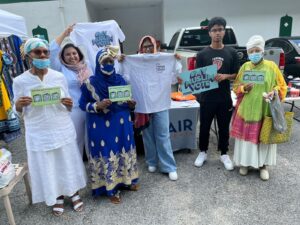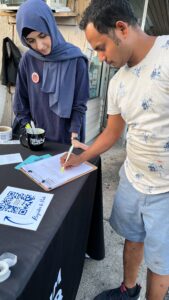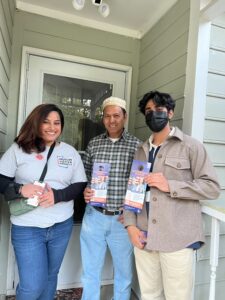In a series of blog posts throughout 2023-2024, RTF will be featuring the BAMEMSA field’s nonpartisan power building strategies. We look forward to sharing the learnings, successes, and creative power building strategies of the BAMEMSA field.
For years, Georgia Muslim Voter Project (GAMVP)’s talented team wanted to expand their reach to more Muslim community members in the state – but the organization only had access to a list of approximately 1,000 Muslim voters in Georgia.
This all changed in 2020, when RTF retained a data expert in mobilizing high potential voters of color and immigrant communities. Through our engagement, Dr. Tom Wong provided GAMVP with a list of 80,000 potential Muslim voters in Georgia – a game changer for GAMVP and other RTF grantees.
 Since then, GAMVP has been consistently working with their local partners and Dr. Wong to deepen engagement within Georgia’s Muslim communities. In 2022, GAMVP worked with Dr. Wong to disaggregate a smaller set of data representing Bangladeshi and Ismaili Muslim communities, reaching a broader set of Georgia’s Bangladeshi and Ismaili community members.
Since then, GAMVP has been consistently working with their local partners and Dr. Wong to deepen engagement within Georgia’s Muslim communities. In 2022, GAMVP worked with Dr. Wong to disaggregate a smaller set of data representing Bangladeshi and Ismaili Muslim communities, reaching a broader set of Georgia’s Bangladeshi and Ismaili community members.
“This list, which comprised of over 80,000 registered likely Muslim voters throughout Georgia with supplemental lists of missing surnames we provided, was instrumental in allowing us to hone our nonpartisan voter engagement strategy,” GAMVP executive director Shafina Khabani told RTF. “This not only helped to increase voter turnout within specific Muslim demographics in Georgia, but it also fostered a stronger sense of community engagement and civic participation.”
There is no match for grassroots groups like GAMVP who understand the diversity within their communities and who can reach different facets of their communities with this level of granularity.
GAMVP’s work with Dr. Wong the past three years, in tandem with their local and statewide partners, is illustrative of the impact RTF seeks to generate for our Black, Arab, Middle Eastern, Muslim, and South Asian (BAMEMSA)-led grantees: long term, data-driven civic engagement that is rooted in the authenticity our grantees bring.
RTF has since 2019 provided interested grantees with nonpartisan voter data and outreach tools, including nonpartisan texting, email, and mail programs. We have made this investment because our grantees have told us that they do not have sufficient access to many of the best tools for effective advocacy and civic engagement – including data, phone, and text programs – even as they hold deep, authentic relationships within their communities. And as RTF has learned from our grantees over the years, information about BAMEMSA voters often does not even exist in traditional voter databases such as the Voter Activation Network (VAN), rendering these communities invisible.
RTF is dedicated to connecting our BAMEMSA grantees like GAMVP – grassroots organizations, many with budgets under $2 million per year – to tools that can help them continue to engage their communities authentically and long-term.
As we did in 2020, RTF evaluated both the quantitative and qualitative impact of our 2022 investment. Our quantitative evaluation showed that four RTF grantees alone conducted nonpartisan outreach to more than half a million voters who otherwise would have been ignored by traditional campaigns. Even more remarkable given the difficulties in mobilizing BAMEMSA communities, voters who grantees successfully reached via nonpartisan door-to-door canvassing, voted at a 9.7 percent higher rate than the voters who were not reached and voters successfully canvassed via nonpartisan live phone banking voted at a 6.4 percent higher rate than the voters who were not.
 While these figures from one election cycle are impressive, our deeper purpose behind evaluation is not to assign points or gold stars, but to empower RTF grantees to understand their impact as well as strengthen and grow their democratic engagement. As Elizabeth McKenna and Joy Cushman write in their working paper for the Democracy, Power and Innovation Fund, “Practice-based evidence for democratic organizing in the 21st century,” “We argue that the development of an alternative metrics framework for democratic practice first requires a significant mindset shift: from viewing the citizen as a consumer of politics to the citizen as democratic agent. When we make that shift, civic organizations become venues for practicing democracy instead of vendors for voter turnout.”
While these figures from one election cycle are impressive, our deeper purpose behind evaluation is not to assign points or gold stars, but to empower RTF grantees to understand their impact as well as strengthen and grow their democratic engagement. As Elizabeth McKenna and Joy Cushman write in their working paper for the Democracy, Power and Innovation Fund, “Practice-based evidence for democratic organizing in the 21st century,” “We argue that the development of an alternative metrics framework for democratic practice first requires a significant mindset shift: from viewing the citizen as a consumer of politics to the citizen as democratic agent. When we make that shift, civic organizations become venues for practicing democracy instead of vendors for voter turnout.”
To that end, Dr. Wong also provides each of our participating grantees detailed evaluation noting potential inefficiencies in their field programs. For example, some grantees knocked on voters doors multiple times, in some cases as many as four times even when their records indicated that a door was unresponsive. Our objective is to ensure our grantees are learning from the evaluation process and can improve their field programs for the future.
GAMVP’s nonpartisan civic engagement activities are closely integrated with the organization’s policy advocacy work. For example in 2022, GAMVP organizers mobilized a rapid-response call to action most recently in response to HB1464, which would have added further restrictions and barriers to Georgians’ abilities to vote and taken funding away from local elections offices.
Critically, GAMVP mobilized from the same lists they work from in their nonpartisan civic engagement efforts.
Their members took on this call to action and educated lawmakers about these harmful stipulations, which resulted in the proposal of a completely revised bill. The new version of this bill expanded voters’ rights, allowing voters to legally take time off during early voting periods or on Election Day to exercise their right to vote.
Going forward, GAMVP anticipates engaging Muslim communities across Georgia in fighting for a range of policy priorities, particularly around voting rights.
In RTF’s qualitative survey of our grantees’ future plans and dreams, 100% of grantee respondents indicated they would like to continue receiving voter data for future years to fuel their policy advocacy efforts. As one grantee shared, “In addition to voter turnout for local elections, we plan to incorporate our issues campaigns (climate justice, refugee advocacy, etc.) as we engage this data provided by RTF.”
Another grantee shared, “When we run a two-year campaign to ensure that Sikhism is accurately included in Virginia state standards, how incredible would it be if we could mobilize every eligible Sikh voter in the state to support those efforts?”
 Taking the Long View: Building Power Toward a Multiracial, Feminist Democracy
Taking the Long View: Building Power Toward a Multiracial, Feminist DemocracyData is just one tool in the toolbox to support our grantees, and we look forward to sharing more RTF strategies in the coming months. Big picture, our investment seeks to undo practices that, as McKenna and Cushman write, view citizens as consumers of politics rather than as agents of democracy.
This project will take iteration, larger investment, and trust in our grantees. We look forward to continuing to support and learn from the BAMEMSA field’s civic engagement efforts.